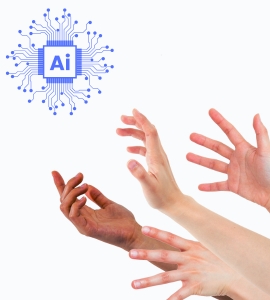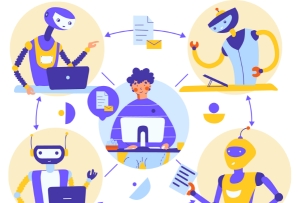The Growing Demand for AI-Driven Solutions

Experion’s AI solutions are the secret behind many industry breakthroughs, seamlessly blending innovation with business impact. Today, many AI software development companies are focusing on creating intelligent systems that can automate business processes. Artificial Intelligence (AI) has rapidly evolved from a theoretical concept to a practical reality, transforming industries and reshaping the way we live and work. In the realm of software development, AI is emerging as a powerful tool that is revolutionizing the entire process, from design and development to testing and maintenance.
AI implies the creation of intelligent agents capable of reasoning, learning, and making autonomous decisions. These agents are capable of performing tasks that typically require human intelligence, such as understanding natural language, recognizing patterns, and making decisions.
The demand for AI-driven solutions is skyrocketing across various industries. From healthcare and finance to manufacturing and customer service, organizations are increasingly turning to AI to gain a competitive edge, improve efficiency, and enhance customer experiences.
Why AI is a Game-Changer in Software Development
AI is a game-changer in software development for several reasons:
- It has reshaped software development by taking over repetitive tasks and incorporating intelligent automation, making the entire process more streamlined and efficient.
- Tools like AI-based testing, automated code suggestions, predictive analytics, and personalized recommendation engines are transforming how developers work, enhancing productivity and reducing errors.
- Previously, manual activities such as testing, coding, and monitoring have now become faster and more accurate.
- Conversational interfaces are easier to build using AI-powered NLP, and DevOps automation simplifies deployments and tracking.
- AI’s advanced security capabilities can also detect and neutralize threats in real-time, leading to quicker development cycles and better user experiences.
What is AI Software Development?

AI software development involves the creation of software applications that incorporate artificial intelligence technologies to perform tasks that typically require human intelligence. These tasks encompass understanding natural language, identifying patterns, making decisions, and learning from past experiences.
AI plays a crucial role in enhancing traditional software development processes by:
- Automating Repetitive Tasks: AI streamlines routine tasks, allowing developers to dedicate their time to more complex and creative aspects of projects.
- Improving Efficiency: AI-driven tools enable developers to code more quickly, detect errors sooner, and optimize overall software performance.
- Enhancing User Experience: AI helps craft personalized, intuitive user experiences, ultimately improving customer satisfaction and engagement.
- Driving innovation: AI enables developers to create new and groundbreaking applications that were previously impossible.
How AI Integrates with Software Development
AI can be integrated into software development in various ways, including:
- AI-Powered Development Tools: Using AI-powered tools to automate tasks such as code generation, testing, and debugging.
- Machine Learning Models: Building and integrating machine learning models into software applications to perform tasks such as prediction, classification, and recommendation.
- Natural Language Processing: Using NLP to enable software to understand and respond to human language.
- AI-Driven Testing: Using AI to automate testing processes and identify potential defects.
- AI-Powered User Interfaces: Creating more intuitive and personalized user interfaces using AI-driven techniques.
In conclusion, AI is a powerful force that is transforming the landscape of software development. By leveraging AI, developers can create more efficient, innovative, and user-friendly software that meets the evolving needs of today’s digital world.
AI Technologies Commonly Used in Software Development
Several AI technologies are commonly used in software development, including:
Machine Learning
Machine learning refers to the process of teaching algorithms to recognize patterns within large datasets and use those patterns to make accurate predictions.
Examples:
- Recommendation Systems: Recommending products or content tailored to individual user preferences.
- Fraud Detection: Detecting suspicious or fraudulent transactions by analyzing behavioral patterns.
- Predictive Maintenance: Forecasting equipment breakdowns before they happen, allowing for timely repairs.
Natural Language Processing (NLP)
Natural Language Processing (NLP) centers on enabling machines to interact with and process human language, allowing them to comprehend, interpret, and generate meaningful responses in natural language.
Examples
- Chatbots: Conversational agents that can interact with humans in a natural language.
- Sentiment analysis: Determining the sentiment expressed in text.
- Machine translation: Text from one language to another is translated.
Computer Vision
Computer vision focuses on training computers to interpret and comprehend visual information, including images and videos.
Examples
- Image recognition: Identifying objects and scenes in images.
- Object detection: Locating objects within images or videos.
- Facial recognition: Recognizing individuals by analyzing their facial features.
These AI technologies can be used individually or in combination to create powerful and innovative software applications. For example, a chatbot might use NLP to understand user queries, machine learning to learn from user interactions, and computer vision to analyze visual information if applicable.
The Impact of AI Software Development
Accelerating Development Processes
AI has the potential to significantly accelerate software development processes by automating repetitive tasks and improving efficiency.
- Automating Code Generation: AI-powered tools can generate code snippets or even entire modules based on natural language descriptions or predefined templates. This can reduce the time and effort needed for manual coding, especially for routine tasks.
- Automating Testing: AI can automate testing processes by generating test cases, executing tests, and analyzing results. This can help identify and fix bugs early in the development process, reducing the overall development time and improving code quality.
Improving Code Quality and Security
AI can also be used to improve code quality and security.
- Bug Detection: AI-powered tools can analyze code for potential bugs, vulnerabilities, and inconsistencies. These tools can use machine learning algorithms to identify patterns that indicate errors or security risks.
- Code Optimization: AI can help optimize code for performance and efficiency. By analyzing code patterns and identifying bottlenecks, AI-powered tools can suggest improvements to enhance performance and reduce resource consumption.
- Threat Detection and Prevention: AI can be used to detect and prevent security threats. For example, AI-powered intrusion detection systems can analyze network traffic for suspicious activity, while AI-driven anomaly detection can identify unusual patterns that may indicate a security breach.
Personalizing User Experience
AI can be used to create more personalized and adaptive software solutions.
- Adaptive Interfaces: AI-powered software can adapt to the user’s preferences, behavior, and context. For example, a recommendation system might suggest products or content based on the user’s past behavior, while a virtual assistant might adjust its language and tone based on the user’s mood.
- Natural Language Interfaces: AI can enable software to interact with users in a natural language, making it easier for users to access and use the software. This can be particularly beneficial for users who are not tech-savvy or who have disabilities.
Real-world examples of AI-enhanced user interfaces
- Virtual Assistants: AI-powered assistants like Siri, Google Assistant, and Alexa are designed to understand and respond to voice commands, making everyday tasks more convenient through natural language interaction.
- Personalized Recommendation Systems: Leveraging AI, platforms such as Netflix, Amazon, and Spotify analyze user behaviors and preferences to deliver tailored recommendations for movies, products, or music.
- Adaptive Learning Platforms: These AI-driven platforms personalize the educational experience by adjusting the content and pace to fit each student’s individual learning style and progress.
AI-Powered Software Development Tools
 At Experion, we harness the power of AI to build smarter, more adaptive software development tools that streamline processes and drive innovation. We’ve successfully delivered these cutting-edge solutions to leading companies worldwide, consistently driving results and efficiency.
At Experion, we harness the power of AI to build smarter, more adaptive software development tools that streamline processes and drive innovation. We’ve successfully delivered these cutting-edge solutions to leading companies worldwide, consistently driving results and efficiency.
Overview of Popular AI Tools
AI-based Integrated Development Environments (IDEs) are becoming increasingly popular among software developers. These IDEs incorporate AI features to enhance productivity, code quality, and overall development experience.
Some popular AI-based IDEs include:
- Codota: This IDE provides intelligent code suggestions based on the context of your code and popular open-source projects.
- Kite: Kite uses machine learning to suggest code completions and snippets as you type, helping you write code faster and more accurately.
- Tabnine: Tabnine offers AI-powered code completion, context-aware suggestions, and code generation capabilities.
AI in Testing and Debugging
AI is also making significant strides in the areas of testing and debugging. AI-powered tools can automate testing processes, identify potential bugs, and enhance the overall quality of software.
- Automated Testing: Tools like Testim and Functionize use AI to create and maintain test cases, reducing the manual effort required for testing. These tools can also identify changes in the application under test and automatically update the test cases accordingly.
- Bug Fixing: AI can help developers identify and fix bugs more efficiently. AI-powered tools can analyze code for potential errors, suggest fixes, and even automatically generate patches.
By leveraging AI-powered tools, software developers can improve their productivity, code quality, and overall efficiency. These tools can help accelerate the development process, reduce the risk of errors, and create better software products.
Challenges in AI Software Development
Data Dependency and Quality Issues
AI models depend significantly on high-quality data for optimal training and performance. When data is insufficient or biased, it can result in skewed outputs and unreliable predictions. Therefore, maintaining data quality, while addressing privacy and security concerns, remains a key challenge in AI software development.
- Data Quality: Gathering and cleaning large, high-quality datasets can be time-consuming and resource-intensive. Missing or inconsistent data can significantly impact model accuracy.
- Data Privacy and Security: Protecting sensitive data used in AI development is crucial. Privacy violations and data breaches can result in significant and far-reaching consequences.
Ethical and Regulatory Concerns
AI brings forth ethical concerns around issues such as bias, fairness, transparency, and accountability. Additionally, navigating regulatory frameworks can be complex, especially as AI technology evolves.
- Bias and Fairness: AI models can inadvertently reinforce biases present in their training data, resulting in unfair or discriminatory outcomes. This highlights the importance of ensuring data diversity and fairness during the development process to mitigate such risks. Ensuring fairness and eliminating bias is a critical ethical consideration.
- Transparency and Explainability: Understanding how AI models make decisions is essential for accountability and trust. Developing transparent and explainable AI models is a challenging task.
- Regulations: Compliance with various regulations, such as GDPR, CCPA, and industry-specific standards, is essential for organizations using AI.
Integration with Legacy Systems
Due to differences in data formats, architectures, and technologies, integrating AI into existing legacy systems can be challenging
- Data Compatibility: Ensuring compatibility between AI systems and legacy systems can be complex when dealing with different data formats and structures.
- Technical Challenges: Integrating AI into legacy systems presents challenges due to mismatches in data formats, architectures, and underlying technologies, often requiring significant adaptation to ensure seamless functionality.
- Cultural Resistance: Overcoming resistance to change and adopting new technologies can be a challenge, especially when dealing with legacy systems.
Addressing these challenges requires careful planning, collaboration, and a commitment to ethical and responsible AI development. By proactively addressing these issues, organizations can harness the power of AI while minimizing risks and ensuring compliance.
Future Trends in AI Software Development
The demand for AI software development services has skyrocketed as organizations increasingly seek to integrate AI into their workflows.
- AI-Driven Development Platforms: The future of software development is likely to see the emergence of AI-driven development platforms that automate much of the software development lifecycle.
- AI in DevOps: AI is already making a significant impact on DevOps, the practice of combining software development and IT operations. AI can automate numerous DevOps tasks, including configuration management, continuous integration and delivery, and infrastructure provisioning. Additionally, AI-powered predictive analytics can help organizations identify potential issues early on and optimize their DevOps processes.
- AI and Quantum Computing: The combination of AI and quantum computing represents an exciting frontier in research, where quantum computing’s immense power could solve intricate problems that traditional computers struggle to handle. By combining AI with quantum computing, it may be possible to develop even more powerful and innovative software applications.
The Potential of Quantum Computing in AI Software Development
Quantum computing has the potential to revolutionize AI software development by providing significant computational power that is currently unattainable with classical computers. This could enable AI models to train on larger datasets, learn more complex patterns, and solve more challenging problems.
Some of the potential benefits of quantum computing for AI include:
- Enhanced Machine Learning: Quantum computing has the potential to significantly accelerate the training of machine learning models, allowing them to detect more intricate patterns and improve the accuracy of predictions.
- Advanced Natural Language Processing: Quantum computing could revolutionize AI’s ability to comprehend and generate human language, leading to more seamless and natural interactions.
- Expedited Drug Discovery: By leveraging quantum computing to simulate molecular interactions, the drug discovery process could be dramatically sped up, making it easier to identify promising drug candidates.
- Optimization of Complex Systems: Quantum computing could be used to optimize complex systems, such as supply chains, transportation networks, and financial portfolios.
Future possibilities and innovations at the intersection of AI and quantum computing
The convergence of AI and quantum computing is a fast-growing field, offering a wealth of exciting possibilities and groundbreaking innovations.
Some of the future innovations that may emerge include:
- Quantum Machine Learning: Developing new machine learning algorithms that leverage the power of quantum computing.
- Quantum Natural Language Processing: Creating more advanced NLP systems that can understand and generate human language in a more natural way.
- Quantum Optimization: Solving complex optimization problems that are currently intractable for classical computers.
- Quantum Generative Models: Developing new generative models that can create highly realistic and diverse content.
As quantum computing technology evolves, we anticipate groundbreaking and more powerful applications emerging at the convergence of AI and quantum computing, pushing the boundaries of what is possible in data processing, optimization, and problem-solving.
The Transformative Power of AI in Software Development
AI is rapidly transforming the software development landscape, offering unprecedented opportunities for innovation and growth. By automating tasks, improving efficiency, enhancing user experiences, and driving innovation, AI is empowering businesses to stay ahead of the curve.
As we’ve seen in this blog, AI has moved from being a futuristic idea to a game-changing reality that’s transforming how we create and use software. For businesses aiming to stay ahead and thrive in today’s fast-paced digital landscape, embracing AI-driven development is no longer optional—it’s the key to success.
How Experion Helps You in AI Software Development
A leading AI software development company can help businesses unlock the full potential of data through machine learning and analytics.
Experion creates AI solutions that don’t just solve problems; they unlock new possibilities, leading businesses toward the future. At Experion, we’re dedicated to empowering our clients by leveraging the power of AI to help them achieve their business objectives. Our team of experienced AI experts can provide a wide range of services, including:
- AI Strategy Consulting: Developing a tailored AI strategy that aligns with your business objectives.
- AI Solution Development: Building custom AI solutions to address specific challenges and opportunities.
- AI Training and Education: Providing training and education to help your team effectively leverage AI technologies.
- AI Implementation and Integration: Integrating AI solutions into your existing systems and processes.
- AI Maintenance and Support: Ensuring the ongoing performance and maintenance of your AI solutions.
Experion Success Story
At Experion, we’re proud to share a success story where we designed an AI-driven digital healthcare solution for neurodegenerative disease patients. By continuously analyzing real-time behavioral data, the platform adjusts intelligently to the progression of cognitive decline, delivering tailored interventions for nutrition, exercise, social interaction, and sleep, significantly enhancing patient well-being.
By partnering with Experion, you’ll unlock the expertise and resources essential for seamlessly integrating AI into your organization, driving innovation and success. Our goal is to help you unlock the full potential of AI and drive innovation in your business. This innovative solution has become one of the most effective tools in enhancing the quality of life for neurodegenerative patients.
Conclusion
Comprehensive AI software development services can accelerate digital transformation and improve customer experiences across industries. AI has become a transformative force in software development, enabling smarter, more adaptive solutions that improve efficiency, personalization, and decision-making across industries. From healthcare to finance and beyond, AI-driven platforms provide real-time insights, automate routine tasks, and offer predictive capabilities that were previously unimaginable. As businesses continue to innovate, integrating AI into their digital strategies will be key to staying competitive and delivering enhanced customer experiences.
Key Takeaways
- AI-powered tools reduce debugging time by identifying errors early and suggesting fixes.
- AI-driven testing automates test case generation and execution, speeding up development.
- AI predicts system failures, enabling proactive maintenance and minimizing downtime.
- AI accelerates code generation, creating code snippets from simple descriptions.
- AI personalizes software interfaces and features based on real-time user behavior.
- AI optimizes cloud resource allocation, improving performance and reducing costs.
- AI enhances cybersecurity by continuously identifying and mitigating security risks.
Partner with Experion today, where our proven track record of delivering AI-driven solutions for industry leaders speaks for itself—let’s create something extraordinary together.


